Prof. Z.M. Khan’s Lecture on “Islamic Worldview: A Reflection”
June 21, 2014 at IOS Conference Hall
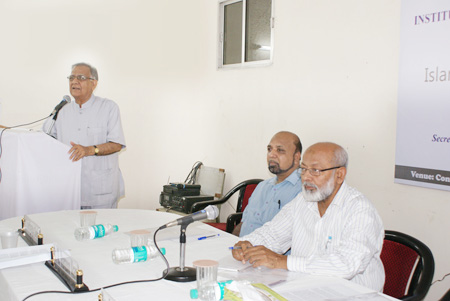
Former professor of Political Science and Dean, Faculty of Social Sciences, Jamia Millia Islamia and Secretary-General of the Institute of Objective Studies, Prof. Z.M. Khan has said the Islamic worldview is comprehensive and presents a well-knit scheme to provide knowledge and explanation about the seen and unseen as explained in the Qur’an. It gives ways and methods to achieve values, establish basic ethical precepts and create a balance in everything, he said, adding that nobody was allowed to exceed the limits prescribed.
Delivering the lecture on the “Islamic Worldview: A Reflection”, organised by the Institute of Objective Studies (IOS) in the Conference Hall of the Institute on June 21, 2014, Prof. Khan pointed out that the Islamic worldview was short, straight and simple. He held that basically, there were two components - faith and positive action. Arguing that all human faculties should be directed to complete one’s role in this world, he noted that faith was very well defined.
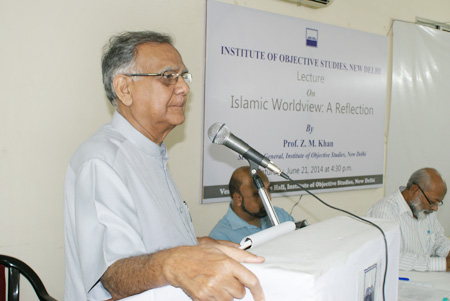
While positive action signified any action committed to bring about an improvement, the quality of action solely depended on the intensity and purity of intention behind the action, he said. He maintained that this aim was to be achieved by the application of all faculties of humans, including intellect, sentiments, feelings, etc. Islam presented the whole scheme with the provision of adjustment with time and place, he remarked. Holding that it was difficult to define the present day situation except that violence and injustice were rampant, he said that there was a growing belief in influential circles that the prevailing situation represented an end of ideology, religion and history.
He continued that human behaviour was shaped by economic and social conditions and these were not in one’s control. Consequently, he said, the situation was beyond control and things could not be put in order. For some people, the solution lay in the application of violence and oppression. Exploitation of the weak was the order of the day and humanity was in search of effective solutions, he observed. He insisted that Islam claimed and presented precedence to offer solution to the problems facing the world today. He regretted that this was not happening today. He called for an effort to define the text in line with the context of the time. He said that the Almighty had sent the message to apply and implement, and finally this was addressing the humanity for all people and time. He wanted to know if it did not make a call for developing faith based on context-friendly paradigm to look at things to make the message relevant to our times. He believed that this might safely be achieved by defining the Islamic worldview. Explaining that worldview was a translation of German word “weltanschauung”, he said that al-Attas had defined it as “a vision of reality as it appeared before one’s mind’s eye revealing what existence was all about.”
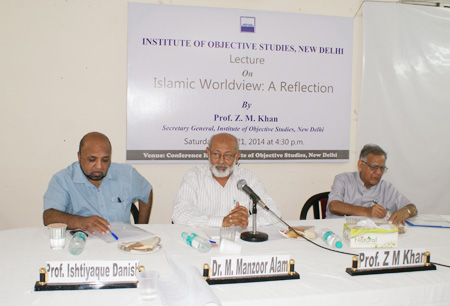
Prof. Khan opined that the present situation testified that the Islamic tradition had worked very hard to keep the faith part high, but the Islamic world had suffered as it did not develop thought and new ideas to cope with the changing times. He laid stress on the urgent need for addressing this question and working on developing new thought. But, this created the need to define the Islamic worldview which was a balanced combination of faith and positive action. He reminded the audience not to forget that God had created this universe and humans with a purpose and responsibility. He concluded by saying that though we possessed the herb, yet we could not dispense it to the patient lying on the deathbed.
Prof. Afzal Wani, Professor of Law at the Gurugobind Singh Indraprastha University and Asstt. Secretary-General of the IOS, called for world peace. He said that Islam always stood for respect to human rights, equality, brotherhood and peace. He noted that Islam touched upon almost every aspect of human life. Senior journalist and policy analyst, Mr. Mohammad Ziyaul Haque, praised Prof. Z.M. Khan for his erudition and vision on issues related to Islam and Muslims. He described the Qur’an as the only Book that went into minutest details of universe and its creations. So many scientific concepts had their origin in the Qur’an which spoke of its infinite depths as often pointed out by the Nobel-winning physicist Abdus Salam. This, Mr. Haque pointed out was one dimension of Islamic worldview.
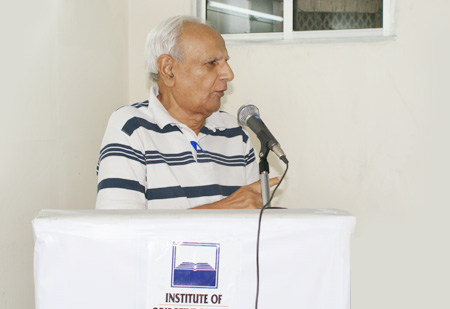
The Chairman of the IOS, Dr. Mohd. Manzoor Alam, who presided over the function, described Prof. Z.M. Khan’s lecture as a “discourse with his students”. He said that the lecture was especially beneficial for the second generation. He held that process, debate and discussion were supplementary to each other. He informed that a panel discussion on the Qur’an and the current situation would be organised by the IOS in the near future in which prominent ulema and scholars would be invited.
He especially referred to a book titled “History of the Science of Qur’an” published by the International Islamic University, Malaysia which deals with many scientific issues on the subject. He observed that the Qur’an spoke of perfection of good deeds. He opined that truth was not what one accepted but the one that was spread through the message far and wide. He sought suggestions from the participants for the topic of the discussion to be held in the near future on “challenges before the Muslim youth in the present world context”
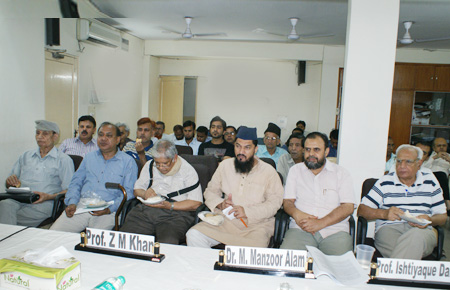
Earlier, the function got off to a start with the recitation of a Qur’anic verse by Hafiz Athar Husain of the IOS Prof. Ishteyaque Danish, Professor of Islamic Studies, Jamia Hamdard, and Finance Secretary of the IOS, who conducted the proceedings, proposed a vote of thanks. The function was attended by the Vice-Chairman of the IOS, Prof. Refaqat Ali Khan, Mr. Mohd. Tanzeem Alam of Falahi Tanzeem, Prof. S.M. Yahya, Mr. Mohd. Khalil, ex-scientist, CSIR, Mr. Shakeelur Rehman Baghaunwi, President, Social Dais and Mr. A.U. Asif, Associate Editor, Chauthi Duniya, besides several university teachers, Islamic scholars, social activists and prominent citizens.
Go Back